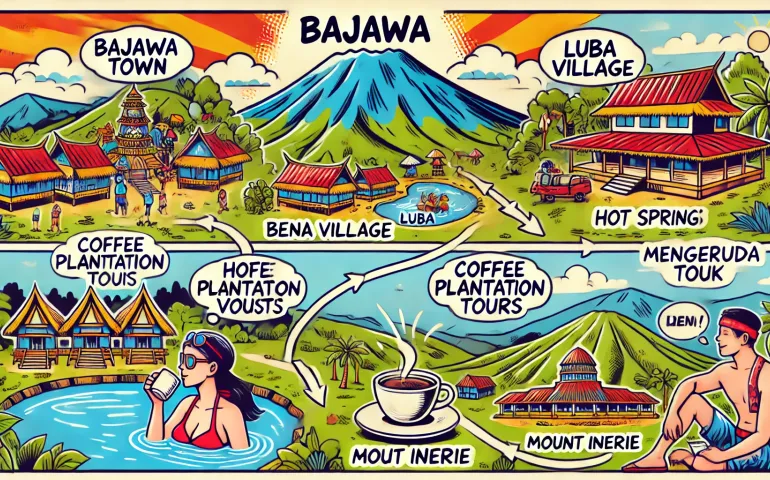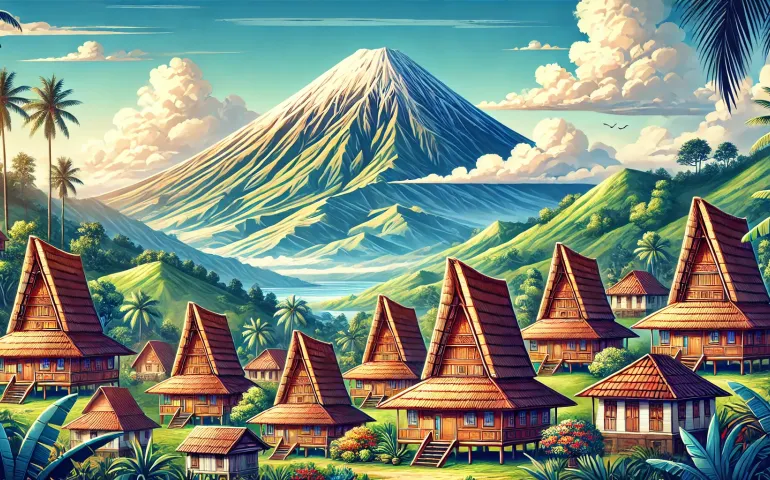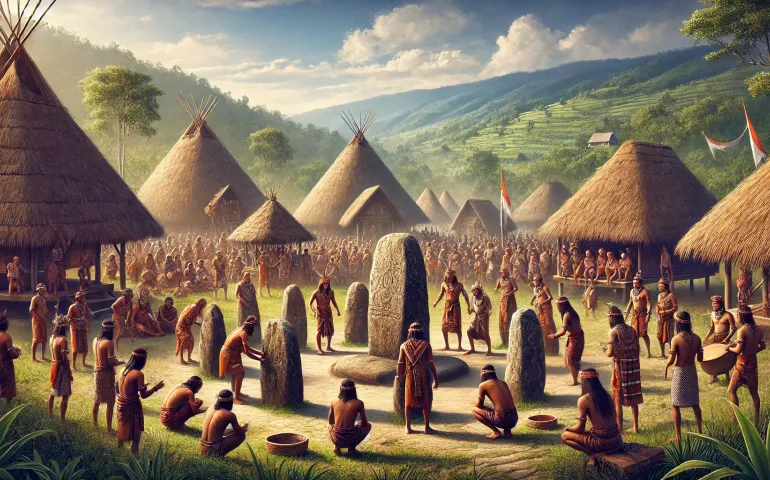About Place
- "A hidden gem nestled in the heart of Flores Island."
- "A sanctuary of traditional culture and stunning landscapes."
- "A perfect blend of natural beauty and cultural richness."
Reasons to Visit
- Cultural Heritage: Bajawa is renowned for its traditional villages, particularly the Ngada villages such as Bena and Luba. These villages offer a glimpse into the ancient customs and architectural styles of the Ngada people. Visitors can explore the megalithic structures, traditional thatched houses, and participate in local ceremonies, making Bajawa a cultural treasure trove.
- Geothermal Wonders: Bajawa boasts an array of natural hot springs, with Mengeruda Hot Springs being a standout. The hot springs are set amidst lush greenery, providing a serene environment for relaxation and rejuvenation. The warm, mineral-rich waters are believed to have therapeutic properties, making it a popular spot for both locals and tourists.
- Stunning Landscapes: Surrounded by mountains, Bajawa offers breathtaking vistas and hiking opportunities. The most notable is Mount Inerie, a strikingly symmetrical volcano that dominates the landscape. Trekking to the summit at sunrise is a rewarding experience, offering panoramic views of Flores Island and the surrounding seas.
Visa
- For ASEAN countries: Visa-free entry for up to 30 days.
- For EU, US, UK, Australia, Canada, and New Zealand: Visa on arrival (VOA) for 30 days, extendable for another 30 days.
- Other countries: Check with the Indonesian embassy or consulate for specific requirements. Some may require a visa in advance.
Travel Expenses
Travel to & from Bajawa:
Approx. $800 for a couple (round trip from Jakarta).
Hotel cost:
$60 per night x 4 nights = $240.
Food cost:
$20 per day x 4 days x 2 people = $160.
Activity cost:
Estimated at $50 per day x 4 days = $200.
Near destination travel cost:
Car rental $30 per day x 4 days = $120.
Total estimated cost: $1,520.

Best Itinerary
Day 1: Arrival in Bajawa Arrive in Bajawa, settling into the beautiful Manulalu Bed & Breakfast. In the afternoon, visit the local market to experience Bajawa’s vibrant atmosphere and try some traditional snacks. Enjoy dinner at Lucas Restaurant, sampling local dishes such as nasi campur and grilled fish. In the evening, relax and acclimate to the serene environment.
Day 2: Explore Traditional Villages Start your day with a hearty breakfast at the hotel. From 9 AM to 12 PM, visit the traditional village of Bena, known for its impressive stone structures and traditional houses. Have lunch at Cafe Mount Inerie, where you can enjoy a mix of Indonesian and Western cuisine. In the afternoon, explore the nearby village of Luba, immersing yourself in the Ngada culture. Return to Bajawa for dinner at Ditos, where you can try local delicacies like babi panggang (roast pork). End your evening with a stroll around the town to soak in the local ambiance.
Day 3: Hot Springs and Coffee Plantations After breakfast, head to Mengeruda Hot Springs from 9 AM to 12 PM. Relax in the warm, mineral-rich waters surrounded by lush greenery. Have lunch at Chacha Restaurant, savoring their special chicken dishes. In the afternoon, visit a coffee plantation to learn about the coffee production process and taste some of the best coffee in Indonesia. For dinner, try the local warung (food stall) for an authentic Indonesian meal, such as ayam goreng (fried chicken). Conclude your night with a visit to the nearby hills for stargazing.
Day 4: Trekking Mount Inerie Rise early and start your trek to Mount Inerie at 4 AM to catch the sunrise. The trek takes about 3-4 hours, offering stunning views from the summit. Return to the base around 10 AM and enjoy a well-deserved lunch at the nearby Warung Rakyat. Spend the afternoon relaxing and recovering from the hike. In the evening, enjoy dinner at Eliana Restaurant, known for its local and international dishes. Wrap up the day with a relaxing night at the hotel, reflecting on the adventures.

Safety Tips
- Keep a copy of your passport and travel documents.
- Stay hydrated and use sunscreen.
- Avoid traveling alone at night.
- Respect local customs and dress modestly.
- Be cautious of your belongings.
- Learn a few phrases in the local language.
- Use registered taxis and transport services.
- Have a list of emergency contacts.
- Follow local health guidelines.
- Always inform someone of your travel plans.
Flights
- Garuda Indonesia: Jakarta to Bajawa, approx. $400 round trip per person.
- Lion Air: Jakarta to Bajawa, approx. $350 round trip per person.
- Citilink: Jakarta to Bajawa, approx. $375 round trip per person.
Hotels
- Manulalu Bed & Breakfast
- Hotel Silverin
- Happy Happy Hotel
- Bajawa Roo Hotel
- Villa Manulalu
Contacts
- Indian Embassy: +62 21 525 2957
- Police: 110
- Ambulance: 118
- Firefighters: 113
Country
Closet Airport
- Bajawa Airport (also known as Turelelo Soa Airport)
Nearest City
- Jakarta
Heritage Sites
- Traditional villages of Bena and Luba
Airlines
- Garuda Indonesia
- Lion Air,
- Citilink
Currency
- Indonesian Rupiah (IDR)
Languages Spoken
- Indonesian
- Ngada language
Real Story
One of the most significant historical events in Bajawa is the preservation of the traditional Ngada villages, which have become a symbol of resistance against modernity and external influences. During the colonial period and later, the Indonesian government's push for modernization, many traditional communities across the country faced pressure to abandon their customs and integrate into the broader national culture. However, the Ngada people of Bajawa managed to maintain their traditional way of life, largely due to their remote location and strong community bonds.
In the mid-20th century, efforts were made by the Indonesian government to assimilate indigenous cultures into the national identity, often at the expense of local traditions. This included the introduction of new agricultural practices, religious conversion, and changes in social structure. Despite these pressures, the Ngada people of Bajawa remained steadfast in their commitment to preserving their heritage. They continued to practice ancestor worship, maintain their traditional houses, and conduct ceremonies that have been passed down through generations.
One pivotal moment in this resistance was the 1970s cultural renaissance led by local leaders who recognized the importance of their traditions in the face of modernization. They organized efforts to document and revive traditional practices, ensuring that younger generations understood and valued their cultural heritage. This movement was instrumental in strengthening the community's resolve to protect their way of life.
The traditional villages of Bena and Luba became the focal points of this cultural preservation. These villages are now recognized as living museums, where visitors can learn about the Ngada culture and witness firsthand the rituals, architecture, and daily life that have remained largely unchanged for centuries. The success of these preservation efforts has not only safeguarded the Ngada heritage but also attracted tourism, providing economic benefits to the community while fostering greater appreciation for their unique culture.
Cuisine
Bajawa offers a delightful array of traditional Indonesian cuisine, with a particular emphasis on local flavors and ingredients. One of the must-try dishes is nasi campur, a mixed rice dish that includes a variety of side dishes such as vegetables, meats, and sambal (spicy chili paste). Another local specialty is babi panggang, which is roast pork prepared with a unique blend of spices and herbs, reflecting the culinary traditions of the Ngada people. Additionally, visitors should try ayam goreng, a flavorful fried chicken dish that is a staple in many Indonesian households.

Culture and History
Bajawa, located in the highlands of Flores Island, is a region rich in cultural heritage and traditional customs. The Ngada people, who inhabit this area, have preserved their ancestral traditions and way of life through generations. The traditional villages of Bena and Luba are prime examples of this cultural preservation. Visitors can witness the unique architecture of the houses, which are made of wood and thatched roofs, and the impressive stone structures used for rituals and ceremonies.
The Ngada people have a deep connection to their ancestors, and this is evident in their practices and beliefs. Ancestor worship is a significant aspect of their culture, with rituals and ceremonies held to honor and communicate with the spirits of their forebears. These rituals often involve the community coming together in the traditional villages, where they perform dances, chants, and sacrifices.
Bajawa's landscape is dotted with megalithic stones, which are believed to hold spiritual significance. These stones are often found in the center of the traditional villages and are used in various ceremonies. The Ngada people also practice weaving, creating intricate patterns and designs that tell stories of their heritage and environment. These textiles are not only beautiful but also serve as a symbol of the community's identity and history.
In addition to its cultural richness, Bajawa is surrounded by natural beauty. The lush forests, mountains, and hot springs provide a stunning backdrop to the traditional villages. The most prominent natural feature is Mount Inerie, a majestic volcano that offers challenging trekking opportunities and breathtaking views from its summit. The geothermal activity in the region has created several hot springs, such as Mengeruda Hot Springs, where visitors can relax and enjoy the therapeutic waters.
